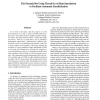20 search results - page 1 / 4 » Supporting highly-decoupled thread-level redundancy for para... |
118
click to vote
HPCA
1998
IEEE
15 years 6 months ago
1998
IEEE
As we look to the future, and the prospect of a billion transistors on a chip, it seems inevitable that microprocessors will exploit having multiple parallel threads. To achieve t...
121
Voted
HPCA
2002
IEEE
16 years 2 months ago
2002
IEEE
Thread-Level Speculation (TLS) allows us to automatically parallelize general-purpose programs by supporting parallel execution of threads that might not actually be independent. ...
113
Voted
SAMOS
2009
Springer
15 years 8 months ago
2009
Springer
We believe that future many-core architectures should support a simple and scalable way to execute many threads that are generated by parallel programs. A good candidate to impleme...
130
Voted
ASPLOS
2006
ACM
15 years 8 months ago
2006
ACM
Exploiting thread level parallelism is paramount in the multi-core era. Transactions enable programmers to expose such parallelism by greatly simplifying the multi-threaded progra...
109
click to vote
IPPS
2010
IEEE
15 years 3 days ago
2010
IEEE
With the shrinking of transistors continuing to follow Moore's Law and the non-scalability of conventional outof-order processors, multi-core systems are becoming the design ...

